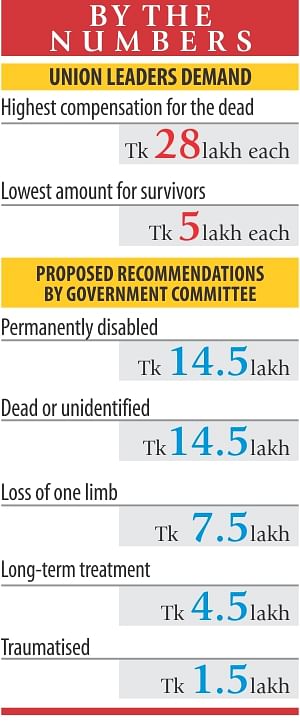Funds too low for Rana Plaza victims, say union leaders
Funds too low for Rana Plaza victims, say union leaders
Protesters demand ILO standards in compensation

Trade union leaders yesterday threatened to launch countrywide protests if the government does not scale up compensations for Rana Plaza victims in line with ILO standards.
The government-appointed 31-member panel recommended Tk 14.5 lakh for each dead victim's family; but under the ILO's 'loss of earnings' standards, which fix compensation based on the age of the victims and the national life expectancy, it would come to Tk 28 lakh.
Union leaders demand compensations based on the national life expectancy which is 67 years for males and 69 years for females in Bangladesh.
The lowest compensation for a survivor under the ILO standards is Tk 5 lakh, whereas it is Tk 1.5 lakh according to the recommendations of the government committee formed on a court order on August 29 last year.
“If our demand is not met, we will go for much bigger protests. We know how to realise the demands of the workers,” Wajedul Islam Khan, a central leader of Sramik Karmachari Oikya Parishad, said at a rally organised in front of the National Press Club in Dhaka.
He said the Rana Plaza collapse happened only for the negligence of the building and garment owners and for weak government mechanisms. “Rana Plaza was like a death trap.”
Nazma Akter, president of Sammilito Garment Sramik Federation, a garment workers' platform, said the fatalities at Rana Plaza were like planned killings, adding that the garment owners are using the members of the civil society to lower the compensation amount.
“Why was there no representation of trade unions in the committee? It is a matter of the workers, after all. Why Tk 14.5 lakh all of a sudden? Who put pressure on the committee?” Hamida Hossain, convener of Workers Security Forum, said at the rally.
She went on to criticise the government, retailers and garment owners for the delay in compensation payment.
Sultanuddin Ahmed, assistant executive director of Bangladesh Institute of Labour Studies, said it is surprising that only the recommendations have come 10 months after the incident—and not the compensation itself.
He urged the government to take responsibility and fix the compensation itself as soon as possible.
Amirul Haque Amin, president of National Garment Workers Federation, demanded the international retailers and the government evenly split whatever compensation is finalised among themselves.